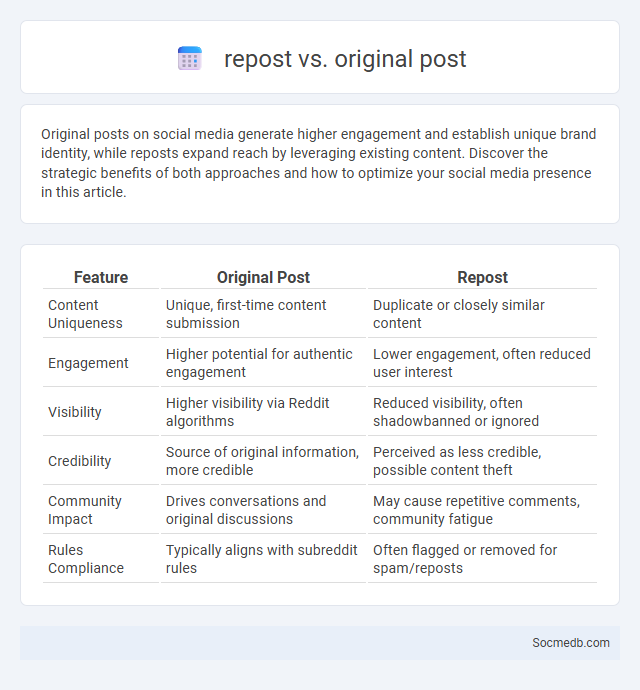
Photo illustration: repost vs original post
Original posts on social media generate higher engagement and establish unique brand identity, while reposts expand reach by leveraging existing content. Discover the strategic benefits of both approaches and how to optimize your social media presence in this article.
Table of Comparison
| Feature | Original Post | Repost |
|---|---|---|
| Content Uniqueness | Unique, first-time content submission | Duplicate or closely similar content |
| Engagement | Higher potential for authentic engagement | Lower engagement, often reduced user interest |
| Visibility | Higher visibility via Reddit algorithms | Reduced visibility, often shadowbanned or ignored |
| Credibility | Source of original information, more credible | Perceived as less credible, possible content theft |
| Community Impact | Drives conversations and original discussions | May cause repetitive comments, community fatigue |
| Rules Compliance | Typically aligns with subreddit rules | Often flagged or removed for spam/reposts |
Understanding Repost, Original Post, and Rule Violation
Social media platforms distinguish between original posts, which are user-generated content, and reposts, where existing content is shared or reshared without creating new material. Understanding these distinctions helps users navigate content ownership and engagement metrics effectively. Rule violations often occur when reposts infringe on copyright, privacy, or community guidelines, leading to content removal or account penalties.
Definition of a Repost
A repost on social media refers to sharing someone else's content, such as a photo, video, or status update, on your own profile to amplify its reach. This practice helps you engage with your audience by circulating valuable information or entertaining posts while giving credit to the original creator. Your ability to repost effectively can boost visibility and foster community interaction across platforms like Instagram, Twitter, and Facebook.
What Qualifies as an Original Post?
An original post on social media is content created uniquely by you, reflecting your own ideas, photos, or videos without copying from other sources. It involves authentic expression, including your personal experiences, commentary, or creative works that haven't been repurposed or directly reposted. Ensuring originality increases engagement and credibility across platforms like Instagram, Twitter, and Facebook.
Identifying Rule Violations in Online Content
Identifying rule violations in online content is crucial for maintaining a safe and respectful social media environment. Automated systems and human moderators work together to detect harmful posts such as hate speech, misinformation, and explicit material. Ensuring your shared content complies with platform guidelines helps protect your account from suspension and fosters positive interactions.
Key Differences: Repost vs Original Post
Reposts on social media share existing content, amplifying reach without creating new material, while original posts generate unique content that drives authentic engagement and brand identity. Original posts often perform better in terms of algorithmic favorability and user interaction due to their novelty. Reposts serve as strategic tools for content curation and audience expansion but depend heavily on the source's relevance and credibility.
Common Examples of Rule Violations
Common examples of rule violations on social media include hate speech, harassment, and the spread of misinformation. Users often breach platform policies by posting offensive content, engaging in cyberbullying, or sharing false news that can mislead audiences. Violations also encompass the sharing of explicit material, spam, and unauthorized intellectual property use.
Impact of Reposts on Content Credibility
Reposts on social media significantly influence content credibility by amplifying visibility and reinforcing trust through repeated sharing by diverse users. When Your content is frequently reposted by reputable accounts, it gains social proof, enhancing perceived reliability and authority. However, excessive reposting without original context may dilute the message's authenticity, risking credibility loss among discerning audiences.
Benefits of Creating Original Posts
Creating original posts on social media enhances engagement by offering unique content tailored to your audience's interests, increasing brand visibility and trust. Original content boosts SEO rankings through fresh keywords and authentic user interactions, driving more organic traffic. Consistently sharing original posts fosters a loyal community and establishes authority in your niche.
How Platforms Detect Reposts and Violations
Social media platforms detect reposts and violations through advanced algorithms that analyze image recognition, text similarity, and metadata. Machine learning models scan content patterns and user behavior to identify duplicated posts, copyright infringements, or harmful material. Automated systems combined with user reports enhance the accuracy of detecting policy breaches and enforce platform guidelines effectively.
Best Practices to Avoid Rule Violations
Adhering to platform-specific community guidelines is essential to avoid social media rule violations, including respecting copyright laws and avoiding hate speech. Consistently monitoring content for accuracy and removing misleading or offensive posts helps maintain compliance with major platforms like Facebook, Instagram, and Twitter. Employing automated moderation tools and staying updated on evolving policies reduces the risk of account suspension or penalties.
 socmedb.com
socmedb.com